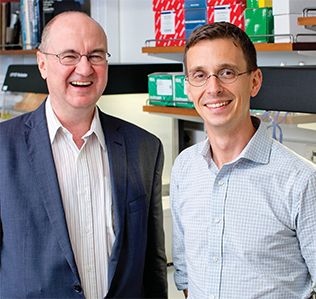As Weill Cornell Medicine fortifies its investment in infectious disease research, two of the institution’s powerhouse scientists have made significant progress toward finding a cure for HIV, with promising implications for a host of other conditions, including cancer and a range of infectious diseases.
Dr. Douglas Nixon, a professor of immunology in medicine, and Dr. Brad Jones, an associate professor of immunology in medicine – research collaborators who were recruited to Weill Cornell Medicine in 2018 – have dedicated their careers to unraveling the complexities of HIV.

Dr. Douglas Nixon and Dr. Brad Jones
“I’m passionate not only about a cure for HIV, but also about the lessons that we can learn in the process, with implications for other areas of human health.” Dr. Brad Jones
Through collaborations with immunologists and virologists in the Division of Infectious Diseases, the Tri-Institutional Therapeutics Discovery Institute (Tri-I TDI), and crossdepartmental research partnerships with physician-scientists at Weill Cornell Medicine, Drs. Nixon and Jones are poised for transformative breakthroughs and the potential for designing new clinical trials.
“With steady financial support, we really stand a chance of helping contribute to eliminating HIV,’’ says Dr. Nixon. “We’ve seen that smallpox has been eliminated, polio has been almost eliminated, hepatitis C is now curable with drugs – and we want to see HIV going that way as well. It’s difficult to put a timeframe on it, but I think it’s possible that HIV can be cured within the next 10 years.”
In the 1980s, a diagnosis of HIV – the virus that causes AIDS – invariably led to death within one or two years, says Dr. Roy Gulick, the Rochelle Belfer Professor in Medicine and chief of the Division of Infectious Diseases. “Now, with current triple combination therapies that we helped design at Weill Cornell Medicine, people with HIV have a lifespan that is the same as the general population,’’ he says. “Even a few years ago, we would have said a cure is impossible. But now we know that’s not true – and donor support can help us take the next steps.”
Through advances made in the field – including work harnessing the immune system to eradicate HIV – Drs. Nixon and Jones have also discovered insights that have an impact on other diseases and pathogens. HIV research pioneered the connection between immune checkpoints and the human immune system. This finding ultimately led to the discovery of checkpoint inhibitors, which have revolutionized treatment for cancer. And advances in tuberculosis have overlapped with advances in HIV research.
At the beginning of the pandemic, Drs. Nixon and Jones pivoted to SARS-CoV-2, the virus that causes COVID-19, joining others in the Division of Infectious Diseases who were conducting cutting-edge research on epidemiology, therapeutics and prevention, including vaccine development. “We have already made significant progress with COVID-19, in terms of mortality rates declining, because of successful treatments that were tested at Weill Cornell Medicine,’’ says Dr. Gulick, who is co-chair of the National Institutes of Health’s COVID Treatment Guidelines.
Dr. Jones recently co-authored a study that highlighted the use of T-cell therapy to fight SARS-CoV-2.
“I’m passionate not only about a cure for HIV, but also about the lessons that we can learn in the process, with implications for other areas of human health,” he says. “When you have a really tough problem to try to solve, like HIV has been, it’s a driver of innovation and discovery that eventually has a lot of silver linings.”
With increasing interest among junior scientists in pursuing careers in immunology and virology, now is the optimum time to support Weill Cornell Medicine’s infectiousdisease initiatives, says Dr. Gulick.
“The COVID-19 crisis has prompted an enormous amount of enthusiasm for infectious-disease research,” he says. “The next generation will truly help us finish what we start.”
